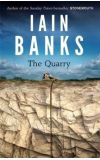
17 Jun 2013 04:58:59
The Quarry is a novel about disease, about "fucking cancer", as it's repeatedly described. It's a novel held up against the dying of the light, a fierce howl into the void that, in the image of the titular quarry, threatens to engulf the characters on every page. Reading this book, one is hit again and again with the fact – tragic and astonishing in equal measure – that Banks didn't know he was dying until he'd almost finished the first draft, that the cancer that was the subject matter of his novel would soon become the urgent subject matter of his life. It makes it a difficult, often distressing read. The Quarry performs in its fine prose those last, sad words of Christopher Hitchens: "I am not fighting or battling cancer, it is fighting me. My two assets were my pen and my voice." I'd managed to reach my mid-30s without picking up one of Banks's books and so have had the melancholy pleasure of immersing myself in the sweep of his oeuvre these past few weeks, working my way through his mainstream novels and the speculative fiction that he wrote under the Iain M Banks moniker (the M is for Menzies). Several of these, particularly, I thought, Use of Weapons, with its double-helix narrative structure and extraordinarily convincing alternative world, are nothing short of masterpieces. His loss is keenly felt. But this is a review, not an obituary, and The Quarry leaves us with much to think about.
This is a very different novel from those upon which Banks's fame lies. It lacks the raw vigour of The Wasp Factory, the gothic shudder of The Crow Road. It lacks even the wintry romance of last year's Stonemouth. Instead, through the eyes of Kit, a hulking autistic teenager, we watch a man – Kit's father, Guy – die of cancer. There is barely a plot, little character development, the action almost all takes place in one location – Guy's crumbling home perched on the edge of a quarry. We have very few of the expected Banksian thrills; in their place, though, is a recognition of the power of fiction to fundamentally alter the reader's consciousness that owes much to Banks's alter ego as a writer of space operas. Rather than taking us to distant galaxies, though, this is a journey into the dark heart of a disease.
Kit's claustrophobic narrative is constrained in time and space: a long weekend at Willoughtree House, a final reunion of university flatmates to bid farewell to Guy. It's Peter's Friends meets Huis clos although instead of the Cambridge Footlights, these fortysomethings studied film at Bewford University (a fictionalised Durham). The friends themselves are sketched-in stereotypes – the politician, the stoner, the journalist, the soulless executives – and the half-hearted McGuffin that underlies the plot barely seems to matter by the end. Kit's voice is overfamiliar: the semi-savant autistic adolescent has become a well-worn literary device, allowing the author to lace the naivety of the child with the insight of the adult. What sustains the novel instead is Guy's mordant indignation at his illness and the way it opens up fissures in the once tight circle of friends.
Solzhenitsyn said of his Cancer Ward that "it is about cancer, cancer as such, not as it is written about in literature devised to entertain people, but as it is experienced every day by the sick". This seems to me what Banks is doing in The Quarry. The remorselessness of the disease is mirrored in the way Guy describes it, the way Banks forces us to witness the everyday indignities and depredations of the sufferer. While Guy's friends are left underdeveloped, cancer itself is a character in this novel and one that is painted with remarkable subtlety and skill. Guy's long speeches on the subject of his illness are bludgeoning, difficult to read even without the underlying hum of biographical contiguity. Through Guy, Banks picks apart the pabulums and platitudes that surround the disease. When Kit suggests some positive thinking, Guy responds in typically spiky (and foul-mouthed) form: "When the pain's bad and you look back on a life that you wish you'd known was going to be this short so you could have shaped it different, and look forward to just more pain and increasing disability and hopelessness, with the ever-enticing prospect of confusion and idiocy lying ahead, if and when the fucking cancer spreads into my brain. Oh yeah; lot to feel fucking positive about there!" There is no let up for the reader, just as there's no let up for Guy: we spend so much time with the disease that it becomes a relief to look up from the page.
The novel ends with an extended riff on a line from Nietzsche. Haze, the stoner, says: "When you stare into the void, it, like, stares back at you." The full quote he's paraphrasing begins: "Battle not with monsters, lest ye become a monster." This, I think, is one of the messages underlying The Quarry: how to look into the abyss without being sucked into it, how to write about (and live with) the monstrous evil of cancer without descending to mere nihilism. This is a novel that's perched at the dangerous edge of things, looking down. It's an urgent novel and an important one and, finally, it's all just so desperately sad.

